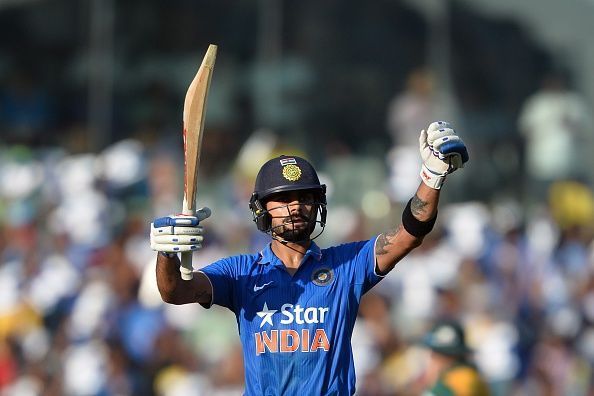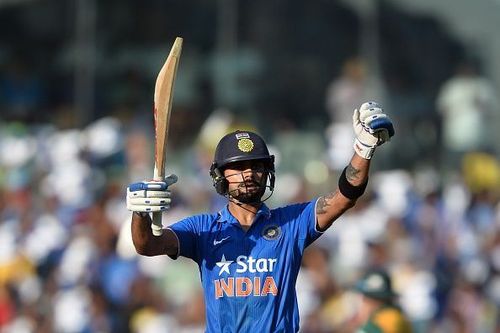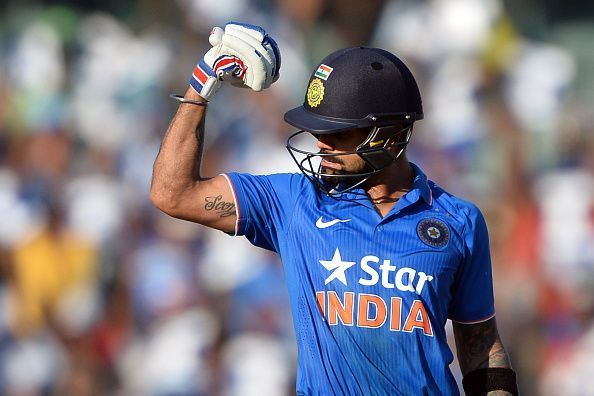
Why Virat Kohli, and not Sachin Tendulkar, is Indian cricket's biggest inspiration

Sachin Tendulkar never inspired me.
When I started getting into cricket at the age of 9, Sachin was already a nationwide phenomenon. Cricket fans at the turn of the century were witness to the birth of a contagious, ill-fated cult of personality. Sachin had become omnipresent in Indian pop culture. He could make a nation exult with a pristine straight drive, or make them weep with an early dismissal.
To scrounge some of cricket commentators' favourite buzzwords - by the age of 30 he wasn't a 'rising star', 'talented cricketer' or 'wily veteran'. He wasn't just an exceptional batsman. He wasn't a heavily lauded athlete. Nor was he just a popular celebrity.
Sachin Tendulkar was a phenomenon.
Over the years, as my fascination with, and understanding of, the game evolved, so did my reverence for him. Yet, for all his incredulous feats, he never inspired me. There is a fundamental, oft-ignored problem with god-given talent - you could only be born with it.
Sachin could never be compared, emulated or replicated. Sachin had broken a national record with Vinod Kambli at an age where other kids were struggling to ride a bicycle. It just seemed too easy - a feeling aided and abetted by the blatant nonchalance with which he describes his freakish knocks in his autobiography Playing It My Way. He made his Test debut at the age of 16 and had surpassed most records well before he was on the brink of retiring. Cricketers like him were meant to be prized and even, if I may take the liberty to claim, worshipped.
Worshipped as a fleeting flash of celestial brilliance that might never be glimpsed again; Sachin was unsurpassable.
Sachin was God.
* * *
The Sydney Cricket Ground was ready for a spectacle.
It was the second semi-final of the 2015 World Cup, in the wake of one of the greatest knockout matches in World Cup history between New Zealand and South Africa. Australia had put on a massive score, yet such scores had shed the accompanying intimidation by 2015. India, a self-professed chasing side, had successfully conquered similar targets multiple times by then, led by the supreme master of chases himself.
The stage was set for an iconic chase, and in walked Virat Kohli to a thunderous ovation.
A burst of pace, some inordinate bounce, an aggressive heave and the world was hushed into overbearing, mind-numbingly engulfing silence as Kohli top-edged a bouncer from Mitchell Johnson. The master of all chases, the saviour of Indian cricket had fallen prey to his own idiosyncrasies.
Seven months later, Kohli was to be found facing South Africa at home, after a poor limited-overs cricket season. He hadn't crossed a score of 50 in ODI cricket since the World Cup. A pernicious concoction of frustration and desperation was conspicuous in each dismissal.
In the sweltering heat and humidity of Chepauk, Kohli ran and cramped his way past 90. South Africa, the notorious chokers, sought to choke him in the 90s - hoping to get a few silent overs in the death as Kohli neared his long-awaited century.
A trap Sachin often fell prey to.
The plans were set: spinners would bowl tight lines with long on and long off. Kohli would need to take singles to ensure a century, by which time South Africa would've ensured overs 40-45 were reasonably quiet.
The spinner bowls his line, but the batsman steps out and lofts the ball straight towards long on. There seems to be a trace of disdain in the shot as if to question the gall of the opposition to formulate a specific plan against the creator of the shot. There are a couple of seconds in which the batsman watches tentatively as the fielder raises his hands for a catch. But the ball has just a bit more flight, spurted probably by the fragments of disdain it was smacked with to scrape over long on's fingers for a six.
Virat Kohli flings his arms wide and flexes for the crowd.
As I watched it unfold, on a laptop screen in a university lecture hall (as you do), I knew it then. This has never been, and will never be, the story of miraculous ability.
It is a story of evolution.

Kohli's autobiography, by his own admission, would start with the tale of a chubby teenager who used to love adding extra butter on his aloo parathas. A kid who used to stock up on chips and chocolates before every cricket match and ensured he wouldn't be disturbed as he gaped open-mouthed at the heroics of a miraculous man, transfixed by the transience of the magic.
In fact, when he finally burst onto the scene, despite being touted as a talented 'rising star', he was never lauded as the man with god-given ability. Those sobriquets were taken by Rohit Sharma, a man who could, or so they claimed, time the ball with both eyes closed.
In a recent interview, Gaurav Kapoor mentioned that Rohit seems to have an extra second to time the ball. Kohli corrects him with 'a second and a half' with a slightly envious, slightly frustrated sigh. It seems that he is perpetually at war - he stands alone in the centre of an ancient duel arena. As he gazes up at the jeering crowd of naysayers, a resounding gong is heard signalling the entry of his opponent and longstanding nemesis. A crescendo of drum beats, a distant piercing war cry, and the veil is pulled back, revealing his archenemy.
He does not see Jimmy Anderson swinging deliveries away from him. Nor does he see a visual representation of the nation's expectations.
At the opposite end of the arena, ready to lock horns in a fatal battle, he sees himself.
Kohli fights an unceasing battle against his own expectations every day. Regardless of the runs against his name in a match, every dismissal is met with a ruthless volley of common Delhi curses - an intrinsic rage that was probably the manifest of battling the politically oppressive and brutally competitive scene of Delhi cricket.
With this rage spawns hunger. A perpetual, frenzied hunger for winning, scoring runs and improving. A man better than the one yesterday. A hunger so incessant, that it would need divine skills to satiate.
But Kohli never had god-given ability. He was, and still is, like you and me. In his youth, he doted obsessively over his cricket heroes. Like you and me. In his early days he gained notoriety for cursing on the field, indulging in revelry off it and adopting every fashion trend in the country. Like you and me. Despite his laurels in ODIs, his place in the Test side was often questioned. As he matured, so did we. Despite his under-19 feats, he still seemed like an above-average individual in his chosen field in life. Just like you and me.
Even his initial IPL performances almost got him dropped from the RCB outfit. This is the story of a man who got hit multiple times, and tried to learn from it. The fact that he has built an immortal legacy today is a testament to his hard-work, commitment and drive. In a sport which has seen many potent sportsmen fall prey to indiscipline, complacency, corruption and greed, he stands out as a man who has built, Dravid-like, a legacy purely on commitment.
Sachin was never the fittest athlete, but he didn't need to be. At times, it felt (unintentionally, I'm sure) that Sachin was a bit detached from the bigger picture. Particularly in his later years, a milestone would bog him down despite the match situation. It would be ignorant, near disrespectful even, to assume that Sachin or Rohit did not put efforts to sustain their magic. But the value of persistence and discipline in comparison to the value in the sustenance of existing skills is up in the air, and I choose the former. Is this why we value a rags-to-riches story more than that of a millionaire who multiplied his wealth?
* * *
In 2014, I was at the Oval when Kohli edged one to the slips. Many cricketers have waned once their shortcomings have been exposed. With each edge, it seemed Kohli was losing sense of his own game. A few months later, he took guard a foot outside his crease to Mitchell Johnson and stroked his way to a career-defining series.
After a series Down Under, in his first Asia Cup match in the subcontinent, he pushed too hard on a sluggish pitch against Bangladesh, after having acquainted himself with the pacy pitches of Australia. A rare duck, and in the next match he played the ball later than anyone else to be the only one to combat a formidable Pakistani pace attack.
He wasn't born the best batsman in the world, but he just might have evolved into one today and there is nothing more inspirational than that.
As Virat Kohli has grown, so have we.